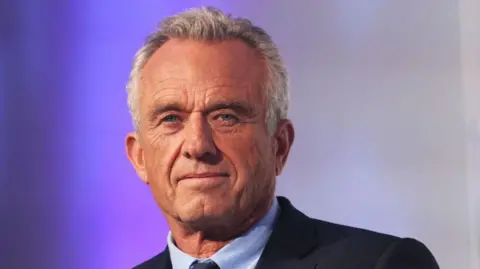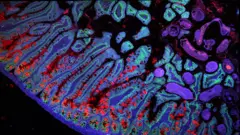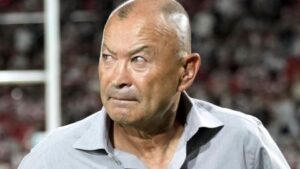Drug hope to treat voice spasm like RFK Jr’s
Sodium oxybate can offer temporary relief, in a similar way to drinking alcohol, a trial suggests.

 Getty Images
Getty ImagesPeople with laryngeal dystonia (LD), a condition that makes the voice sound strained and hoarse, might benefit from a drug already used to treat a sleep disorder, researchers say.
Some volunteers who tried the narcolepsy treatment, sodium oxybate, found it eased their speech in a similar way to drinking alcohol, but without intoxication.
LD, a neurological problem where the vocal cords spasm, has drawn more attention since US President-elect Donald Trump appointed Robert F Kennedy Jr – who has the condition – to his new team.
US journalist and broadcaster Diane Rehm also has it.
 Getty Images
Getty ImagesBotox (botulinum toxin) injections are often used to treat LD but are ineffective for up to 40% of patients, the researchers, from the Massachusetts Eye and Ear hospital, say.
Lead investigator Dr Kristina Simonyan said: “We hear many stories of broken lives and careers from patients with laryngeal dystonia and they have been desperate for new treatments.
“Our trial gives us hope for a new, effective treatment that can be offered to some of these patients.”
Her team decided to try low-dose sodium oxybate, after some patients told them their symptoms improved after a few alcoholic drinks.
Vodka shots
It is chemically identical to inhibitory neurotransmitter gammahydroxybutyric acid (GHB), which mimics some effects of alcohol.
But it is not the same as illicit GHB – a dangerous and illegal drug misused for its euphoric effects.
And the researchers stress their study, published in Annals of Neurology, used carefully controlled prescription medication.
But first, they gave 106 LD patients vodka shots.
The symptoms of 56 showed no improvement, while the other 50 did experience smoother speech.
Significantly improved
At a later date, all of the volunteers were given either a single dose of prescribed sodium-oxybate liquid medicine or a dummy or placebo.
And again, the 56 showed no real improvement with the drug, while the other group – the alcohol responders – did, with effects lasting up to five hours.
There were some mild side effects such as nausea and dizziness, but no serious ones, say the researchers.
They are now starting a larger, phase 3 study.
“Our findings suggest that sodium oxybate can be taken on an as-needed basis, such as before work or a social event, so patients can tailor treatment to their own daily needs and get in control of their symptoms,” they said.
‘Novel surgery’
Jemma Haines from the Royal College of Speech and Language Therapists said: “Dr Simonyan’s work gives promising data for an effective alternative treatment option and future hope to our service users who suffer this debilitating communication disorder.”
Dayna Ferdinadni, from Dystonia UK, said the study showed promise but more checks were needed.
“The drug has not yet been approved by NICE [National Institute for Health and Care Excellence] or the NHS for use in treating dystonia and further rigorous evaluation is needed to assess its safety, efficacy, and long-term impact,” she said.
“We welcome any research into dystonia, but it is crucial that new treatments undergo thorough scrutiny before being considered for widespread use.”
The causes of LD are not yet fully understood, the charity says, but vocal exercises and relaxation can help.
Symptoms often appear in midlife.
Kennedy, 70, says he had “a very strong voice” before developing LD, at 42.
He recently had “novel surgery” on his larynx (voice box), in Japan, which helped his voice, he says.





